|
|
|
Sort Order |
|
|
|
Items / Page
|
|
|
|
|
|
|
| Srl | Item |
| 1 |
ID:
173789
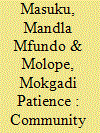

|
|
|
|
|
| Summary/Abstract |
In South Africa, community members have the constitutional right to partake in local governance and the local municipal council has the constitutional mandate to facilitate community participation. Qualitative research was used to assess the impact of power relations on community participation in the Mahikeng Local Municipality. The study findings indicate that power differentials contributed to the abandonment of the legislative provisions in the Mahikeng Local Municipality in the North-West Province of South Africa. Among other things, this paper recommends finalisation of the draft public participation framework. The framework should clearly identify and define the roles of the community, elected councillors and traditional authorities. The paper recommends the development of a strategy that includes clear and comprehensive public participation guidelines, protocols and processes to facilitate implementation of the framework. In consultation with the community, a detailed community participation schedule must be developed, implemented and continuously monitored and evaluated.
|
|
|
|
|
|
|
|
|
|
|
|
|
|
|
|
| 2 |
ID:
098466
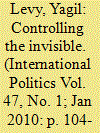

|
|
|
|
|
| Publication |
2010.
|
| Summary/Abstract |
Militaries work intentionally, visibly and in a politically controlled manner to fulfill their formal assignments as the professional perpetrators of external violence on behalf of the state. It is to this level of military action that the existing literature on the civilian control of the military is confined. However, through the intensive interaction between the military and civilians, the effects of formally controlled military activity go beyond the professional domain and are felt in civilian areas, where, in the long term, military activity helps create structures of unequal power relations. Given its structural dimension, this aspect of the military is not necessarily or immediately visible to the main agents involved; hence, it is divorced from effective civilian control. I conceptualize this neglected type of control as effectual control, distinct from the theoretically well-established notion of operational control. This paper theorizes the essence of effectual control.
|
|
|
|
|
|
|
|
|
|
|
|
|
|
|
|
| 3 |
ID:
130992
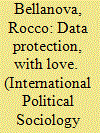

|
|
|
|
|
| Publication |
2014.
|
| Summary/Abstract |
How to Engage with the Politics of Privacy in the Age of Preemptive Security? My suggestion is to start with data protection, which, following De Hert and Gutwirth (2006), is not exactly the same of privacy. Extrapolating from their analysis of the two as different "legal tools," I would say that privacy and data protection are two slightly different rationales of power relations: one of privacy based on the "opacity of the individual" and one of data protection on the "transparency and accountability of the powerful" (Gutwirth and De Hert 2008:275; emphasis in original).1 These rationales (attempt to) orientate two different loose dispositifs, each formed by a composite ensemble of elements. Some of these elements are peculiar to each dispositif, while others are shared or encompassed by both
|
|
|
|
|
|
|
|
|
|
|
|
|
|
|
|
| 4 |
ID:
148620
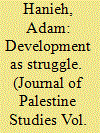

|
|
|
|
|
| Summary/Abstract |
The occupied Palestinian territories (oPt) are a major recipient of global aid flows, ostensibly aimed at improving development outcomes for the Palestinian population. This article presents a critical analysis of the ways that development is being conceived and practiced by major actors in the oPt. By analyzing different conceptions of power, the article examines how dominant approaches to development hide the ongoing reality of Israeli settler colonialism by dehistoricizing Zionism and its project; incorporating the structures of Israeli occupation into official Palestinian development strategy; and promoting an economic perspective that views development as an objective and disinterested process operating above (and outside) power relations. After considering some of the ramifications of current approaches to development, the article concludes with brief remarks on how this critique can help to reframe and articulate an alternative strategy.
|
|
|
|
|
|
|
|
|
|
|
|
|
|
|
|
| 5 |
ID:
121731
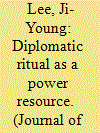

|
|
|
|
|
| Publication |
2013.
|
| Summary/Abstract |
What explains Korea's success in surviving as an independent state for over 2,000 years, not annexed to China, when it shares a border with this powerful imperial neighbor? I argue that diplomatic ritual can be conducive to managing asymmetric power relations and that the Korean state and the Chinese state prior to the nineteenth century used the diplomatic ritual of investiture in a strategic manner as a signaling mechanism to manage the expectations of each side. Drawing insights from ritual studies, I offer three specific mechanisms: (1) regularity and precision, (2) strategic ambiguity, and (3) the manipulation of symbols, through which the ritualization of power relations reduces the tension arising from the disparity in power. The empirical evidence comes from an investigation of a total of sixteen investiture cases between Choso n Korea and Ming China between 1392 and 1644. It shows that the granting and seeking of investiture on both sides was not only a way of signaling their commitment to the status quo, but also a medium of negative soft power through which the stronger side could change the status quo relations to its favor using the symbolic power embedded in the investiture ritual.
|
|
|
|
|
|
|
|
|
|
|
|
|
|
|
|
| 6 |
ID:
120525
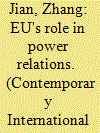

|
|
|
| 7 |
ID:
131795
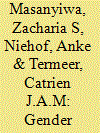

|
|
|
|
|
| Publication |
2014.
|
| Summary/Abstract |
Increasing participation in decision-making processes by service users is one of the objectives of decentralisation reforms in Tanzania. The argument is that decentralisation enhances participation by all sections of the community, and by women in particular, and results in decisions that better reflect local needs. This paper examines the impact of decentralisation reforms on service users' participation for delivery of water and health services in rural Tanzania, using a gender perspective and principal-agent theory. The paper investigates how decentralisation has fostered spaces for participation and how men and women use these spaces, and identifies factors that constrain or encourage women's participation. It shows that decentralisation reforms have created spaces for service users' participation at the local level. Participation in these spaces, however, differs between men and women, and is influenced by the socio-cultural norms within the household and community. Men have gained more leverage than women to exercise their agency as principals. Women's participation is contributing to addressing practical gender needs, but strategic gender needs have been less adequately addressed because gendered power relations have been largely untouched by the reforms.
|
|
|
|
|
|
|
|
|
|
|
|
|
|
|
|
| 8 |
ID:
083849
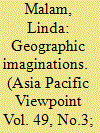

|
|
|
|
|
| Publication |
2008.
|
| Summary/Abstract |
This paper explores contrasting narratives of place meaning in a tourism site in Southern Thailand. Specifically, I analyse the parallel discourses of community change through tourism development embedded in international backpacker narratives, and those of the local Thai elite. By configuring identity and power around binary oppositional categories such as West as economically powerful and dominant/non-West as economically weak and subordinated, 'traditional' tourism studies often locate the dynamics of change in the international tourism industry. To date, there is little research on the very real and important ways that people working in tourism assert agency and understand their own identities in everyday contexts. I argue that local communities can, and often do, shape the changes that tourism development initiates in very creative and adaptive ways.
|
|
|
|
|
|
|
|
|
|
|
|
|
|
|
|
| 9 |
ID:
173847
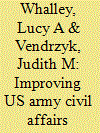

|
|
|
|
|
| Summary/Abstract |
Soldiers with operational experience in Afghanistan or Iraq have offered numerous critiques of the US Army Civil Affairs doctrine on assessment of the human domain, making recommendations for its improvement. The current process uses two frameworks, commonly known by the acronyms ASCOPE and PMESII-PT, to evaluate the operational environment. Neither the current process nor the proposed improvements address social power relations. It is unlikely that civil-military operations intended to establish peace and maintain stability will be successful if they are planned and executed without an in-depth understanding of social power. We advocate incorporating social power analysis into Civil Affairs assessment.
|
|
|
|
|
|
|
|
|
|
|
|
|
|
|
|
| 10 |
ID:
097927
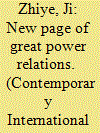

|
|
|
| 11 |
ID:
122838
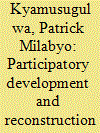

|
|
|
|
|
| Publication |
2013.
|
| Summary/Abstract |
In the past decade researchers and development experts have been preoccupied by participatory development and reconstruction. Despite criticisms of its potential, it has been at the centre of development practices. This review of both published and unpublished literature aims to assess the importance of participatory development and reconstruction, especially its positive and negative characteristics. The paper shows that, despite its potentially transformative role, its main drawback rests in the power relations between elites and non-elites and that creating comprehensible ways through which non-elites can deal with these relations is one issue that needs additional research. Other issues that need more research are related to how to sustain the participatory development and reconstruction outcomes by increasing local ownership, and how to better involve existing structures and institutions (both state and non-state actors) in development and reconstruction efforts for poverty alleviation.
|
|
|
|
|
|
|
|
|
|
|
|
|
|
|
|
| 12 |
ID:
130275
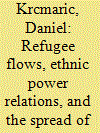

|
|
|
|
|
| Publication |
2014.
|
| Summary/Abstract |
Why do some refugee flows cause conflict in the host state and others do not? Drawing on bargaining models of war, I argue refugees are especially likely to cause conflict when they alter the host state's ethnic balance of power. More specifically, I explain why multiple informational and commitment problems arise when refugee flows produce a rapid shift in relative power between ethnic groups. As an empirical strategy, I examine a unique controlled comparison made possible by the influx of Kosovar refugees into Albania and Macedonia in 1999 that eliminates over a dozen competing explanations for civil conflict. I then use process tracing to demonstrate how a change in relative power between ethnic groups fostered violence in Macedonia, whereas the preservation of the ethnic balance facilitated a peaceful refugee flow into Albania. This evidence, though tentative, indicates that a refugee flow's effect on the host state's ethnic balance of power can help explain whether the state experiences peace or conflict.
|
|
|
|
|
|
|
|
|
|
|
|
|
|
|
|
| 13 |
ID:
133016


|
|
|
|
|
| Publication |
2014.
|
| Summary/Abstract |
This article contributes to current debates and discussions in critical social theory about diversity, inclusion/exclusion, power, and social justice by exploring intersectionality as an important theoretical resource to further develop and advance care ethics. Using intersectionality as a critical reference point, the investigation highlights two key shortcomings of care ethics which stem from this ethics' prioritization of gender and gendered power relations: inadequate conceptualizations of diversity and power. The article draws on concrete examples related to migrant domestic work to illustrate how an intersectionality lens can advance new theoretical insights for understanding caring practices (or lack of them), and generate new methodological and practical strategies for confronting and transforming the deeply entrenched interlocking power inequities that undermine the realization of care in an increasingly complex context of national and international policy and politics.
|
|
|
|
|
|
|
|
|
|
|
|
|
|
|
|
| 14 |
ID:
132388
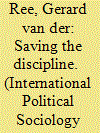

|
|
|
|
|
| Publication |
2014.
|
| Summary/Abstract |
For several decades, the field of International Relations theory has been preoccupied with its own methodological and theoretical plurality. As a consequence, IR scholars have proposed a range of different solutions to this "problem." In doing so, they have drawn from different sources of social capital in the field, allowing them to base their legitimacy on the ways they relate to "progress" and the status quo. Drawing from Bourdieu's sociology, this article will explore five different strategies for "saving the discipline" and show how they relate to different kinds of scientific capital and power relations in the field. It will also explore the ways in which social conventions (such as politesse) can be used as tools for symbolic violence. The article will finish by arguing that rather than a problem to be resolved, plurality functions as an organizing principle regulating social power relations in the field.
|
|
|
|
|
|
|
|
|
|
|
|
|
|
|
|
| 15 |
ID:
074883


|
|
|
|
|
| Publication |
2006.
|
| Summary/Abstract |
The Social Map is an attempt to formulate an integrative theoretical model of individual and collective identity processes that draws upon sociological, psychological and biological knowledge in an effort to move towards a more comprehensive understanding of key questions surrounding the construction of experience and identification. This article summarizes the key features of the approach and considers the way in which it might offer a useful perspective on key questions relating to identities, power relations, social cohesion and conflict, including the way in which the bio-psychosocial processes that underlie these social phenomena can be seen to mediate if not structure their expression at the macro level within and across societies.
|
|
|
|
|
|
|
|
|
|
|
|
|
|
|
|
| 16 |
ID:
174258
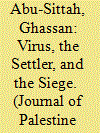

|
|
|
|
|
| Summary/Abstract |
This essay explores the challenges and opportunities that the Covid-19 pandemic has afforded Israel as it broadens its settler-colonial objectives internally, in Gaza, and elsewhere. In particular, it sheds light on the heightened militaristic and economic approaches taken by Israel to further entrench its siege of Palestinians in Gaza and to export increasingly advanced technologies of surveillance and state control long deployed against the Palestinian people. This investigation thus offers an opportunity to probe settler colonialism's strategic opportunism in the face of the historic pandemic.
|
|
|
|
|
|
|
|
|
|
|
|
|
|
|
|
| 17 |
ID:
157108
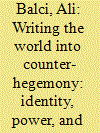

|
|
|
|
|
| Summary/Abstract |
This article is an attempt to develop a theoretical framework about how to study dissident ethnic movements’ foreign policies. Is it possible to speak about foreign policies of ethnic dissident movements, especially when it is considered that they have no characteristics of modern sovereignty such as territory and recognition? For example, do the Berbers in Morocco, the Catalans in Spain, the Balochs in Iran, and the Kurds in Turkey have a foreign policy? If they do, how do we study their policies toward the outside world? Specifically, focusing on the case of the Kurds in Turkey, this article attempts to provide a theoretical framework for how to study dissident ethnic movements’ foreign policy performances. By looking at the effect of the end of the Cold War on the Kurdish nationalists’ imagination of the United States, this article interrogates how the change in their imagination played a role in the construction and reconstruction of the post-1980 Kurdish identity in Turkey. It also draws on the work of poststructural and postcolonial Ernesto Laclau, David Campell, and Edward W. Said in order to develop the theoretical framework.
|
|
|
|
|
|
|
|
|
|
|
|
|
|
|
|
| 18 |
ID:
130642
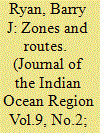

|
|
|
|
|
| Publication |
2013.
|
| Summary/Abstract |
This paper examines power relations along the African coast of the Indian Ocean in terms of space and time. Spatial strategies, it argues, are swiftly emerging through zoning mechanisms which territorialise the governance of ocean space. These strategies can supplement and disrupt more traditional temporal strategies, which facilitate speed and freedom of movement for commercial and military traffic. The article focusses on the US proposition to provide maritime security sector reform to African coastal states as a form of temporal strategy designed to shape new zoning practices in favour of freedom of movement. The paper concludes by arguing that the US strategy implies a policing approach that generates maritime surveillance capacities along land-sea lanes of communication. It contrasts this surface form of knowledge with the need for African coastal states to generate the sort of oceanographic data presently undergirding the emerging blue economies of Europe.
|
|
|
|
|
|
|
|
|
|
|
|
|
|
|
|
|
|
|
|
|